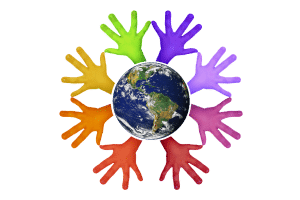How would you describe the past year? Crazy? Unprecedented? And how have you felt during this crazy and unprecedented year? Scared? Frustrated? Bored? Zoom-weary? How about lonely? If so, you’re not alone (no pun intended): over the past year, a “loneliness epidemic” has been brewing, with 36% of respondents in one study last year saying they felt lonely “frequently” or “almost all of the time or all the time,” as compared with 25% in the weeks before the pandemic. Another study found that 20% of people across all age groups reported feeling lonelier than usual during the pandemic.
But the truth is that the problem didn’t start with the pandemic: a 2018 study conducted by the Kaiser Family Foundation revealed that around 22% of Americans felt “constantly” alone, and a report by the health insurance company Cigna found that 60% of Americans felt some degree of loneliness, pre-pandemic. Because feeling connected to others is vital to our emotional and physical health, it’s important to find some strategies to combat the loneliness that sometimes overwhelms many of us.
Social Isolation vs Loneliness
Take the pandemic out of the picture, and, if you look at our society objectively, it seems like it would be difficult to feel lonely. If anything, we might be too connected for some people’s tastes! We have unlimited ways to digitally connect; we can (or will be able to again soon) hop on a plane and head anywhere in a matter of hours; more and more of us live in close quarters with neighbors all around us. Yet we still feel lonely, and that’s because there’s a difference between social isolation and loneliness.

Social isolation is all about the amount of actual contact you have with others, while loneliness is much more subjective: it’s all about how you experience being alone or even how connected you feel to those around you. Think about it this way: just because you’re alone doesn’t mean you’re going to feel lonely, and just because there are people all around you doesn’t mean you’re not going to feel lonely. So it becomes very important to name loneliness, and to validate it; recognize that it is different from being alone, and that it is not shameful. Once you do that, you can begin to release those feelings.
The Physical Risks of Loneliness
It’s not only important for our mental well-being to deal with our feelings of loneliness, it can also be vital to our physical health. Studies show that loneliness isn’t only linked to mental health issues like depression, anxiety, and suicide, it is also linked to a variety of health problems like dementia and heart conditions. It has also been shown that people without social support have lower chances of full recovery after a serious illness than people with a strong network. In fact, the health consequences of loneliness are often compared to the effects of smoking 15 cigarettes a day – and far fewer people do that than there are people who feel lonely every day!
Strategies for Coping with Loneliness
So if you’re struggling with loneliness, what can you do to help improve your emotional and physical well-being, as well as to simply get more enjoyment out of life? Therapists, doctors and researchers suggest trying some of the following strategies:
- Look at what you’ve got – When you’re really feeling down, it can be annoying to have people tell you to look at all the good things around you. But when it comes to feeling lonely, that can be extremely important: one of the first steps to combating loneliness, other than naming it, is to examine all of the connections you already have in your life. Maybe you’re worrying that your friends aren’t telling you how they feel about you, but they might be showing it in other ways.

In other words, according to Kory Floyd, Professor of Communication and Psychology at the University of Arizona, “Many of us get tunnel vision when it comes to affection and intimacy, in that we ‘count’ only certain behaviors while discounting others…When people expand their definitions of affection and love to include a wider range of behaviors, they often discover that they aren’t as deprived as they originally thought.”
- Talk to yourself – No, we’re not being silly here. What we mean is, when you’re feeling especially lonely, you should ask yourself questions, like what loneliness means for you. Also question whether you’re chronically lonely or lonely because of the situation you might be in at that moment in your life. Megan Bruneau, therapist and executive coach, says, “…[I]f I’m feeling loneliness more frequently than usual, I get curious about the shift. Has something changed in my relationships leading me to feel more disconnected? Have I been nurturing my current connections and creating opportunities for new ones that make me feel ‘seen’? Am I intentionally or accidentally isolating [myself]?” Look at what’s going on with you, so that you can decide how best to deal with your feelings.
- Hit the brakes – When you think of loneliness, do you equate it with boredom? Well, the opposite might actually be the case: sometimes when you’re too busy you can get wrapped up in all of that stuff that needs to get done, and you can start to feel disconnected from the people around you. Psychiatrist Judith Orloff, MD, agrees: “Sometimes when people’s schedules are back-to-back for too long, they start disconnecting from themselves and other people. They get overwhelmed from overworking and too much stimulation. So the practice [then] is just to relax and do what their body needs.” If you find yourself overwhelmed with work and your to-do list, take a step back, slow down, and first reconnect with yourself with your favorite relaxation techniques – then you can begin to reconnect in meaningful ways with the world around you.
- Find kindness – If the world seems cold to you, try to find ways to warm it up. Perform a random act of kindness, like paying for someone’s coffee, or even just smiling at someone or holding the door for them. Research shows that these acts release oxytocin, otherwise known as the bonding hormone, so even just a small, brief connection with another person can relieve feelings of loneliness.

- Join the club(s) – Volunteering can be one way to meet new people who have similar interests; another way is to join a club, sign up for a class, or even try something completely new – like goat yoga! If this is something that interests you, start looking for groups now that you might like to join; they might have an online presence and they might be starting to meet up in person very soon!

Adopting a pet can help you feel more fulfilled in your daily life.
- Adopt a friend – It might sound like a cliche, but, really, a pet can be a person’s best friend, or at least a way to help fill a hole in your life. Whether it’s a playful dog to get you out of the house, a quiet cat to relax with on the couch, or any other furry or feathered creature, adopting a pet (and taking on the responsibility of caring for it) can help you feel more fulfilled in your daily life.
- Get creative – Even if you don’t think of yourself as the “creative” type, tapping into your creative side can help ease loneliness; in fact, you can try to embrace periods of solitude as opportunities to be more self-aware and creative. According to therapist and author Shrein Bahrami, “The experience of feeling lonely can often trigger a host of other emotions. When we are connected to our emotions, allowing ourselves to feel them and express them through creativity can be quite healing and meaningful.” Try writing, sketching, painting – even dancing to your favorite music and sitting quietly and knitting can get those juices flowing!
- Be careful with social media – Being social can be a great antidote for loneliness – but how about using social media? Does social media cause loneliness and depression, or make it worse? Well, that’s still up for debate, but what is more important is how it affects you and how you use it in your life. For some people, social media is genuinely a way to stay connected, but for others, it can be a way to withdraw into themselves in unhelpful ways.
When it comes to social media, first take a look at how much time you’re spending on it: according to a University of Pennsylvania study, limiting social media use to 30 minutes a day “may lead to significant improvement in well-being.” And it’s not just the amount of time you’re spending on social media that you should be examining; in fact, some researchers suggest that it’s not really how often you use it, it’s how you utilize it. Think about what you’re getting out of it and how it makes you feel. For example, using it to try to escape from the world can backfire, or scrolling through everyone else’s “curated” lives can give you serious fear of missing out (FOMO), or make you feel like you’re being purposefully not included in other people’s lives. Again according to Professor Floyd, “If we feel dissatisfied with our face-to-face relationships, we [often] retreat into the world of social media, which only exacerbates the problem. On social media, it seems as though everyone else has better jobs, better houses, better vacations, and better relationships than we do. That isn’t actually true, of course.”
Remember, if you’re feeling lonely, you’re not alone – in more ways than one! And perhaps knowing that there are others out there feeling what you’re feeling will actually help you to feel more connected to the world around you, and will tell you that it’s time to reach out. If you’re really struggling, though, please speak to a doctor, therapist, or other trusted professional. Together, we can beat the loneliness epidemic!

